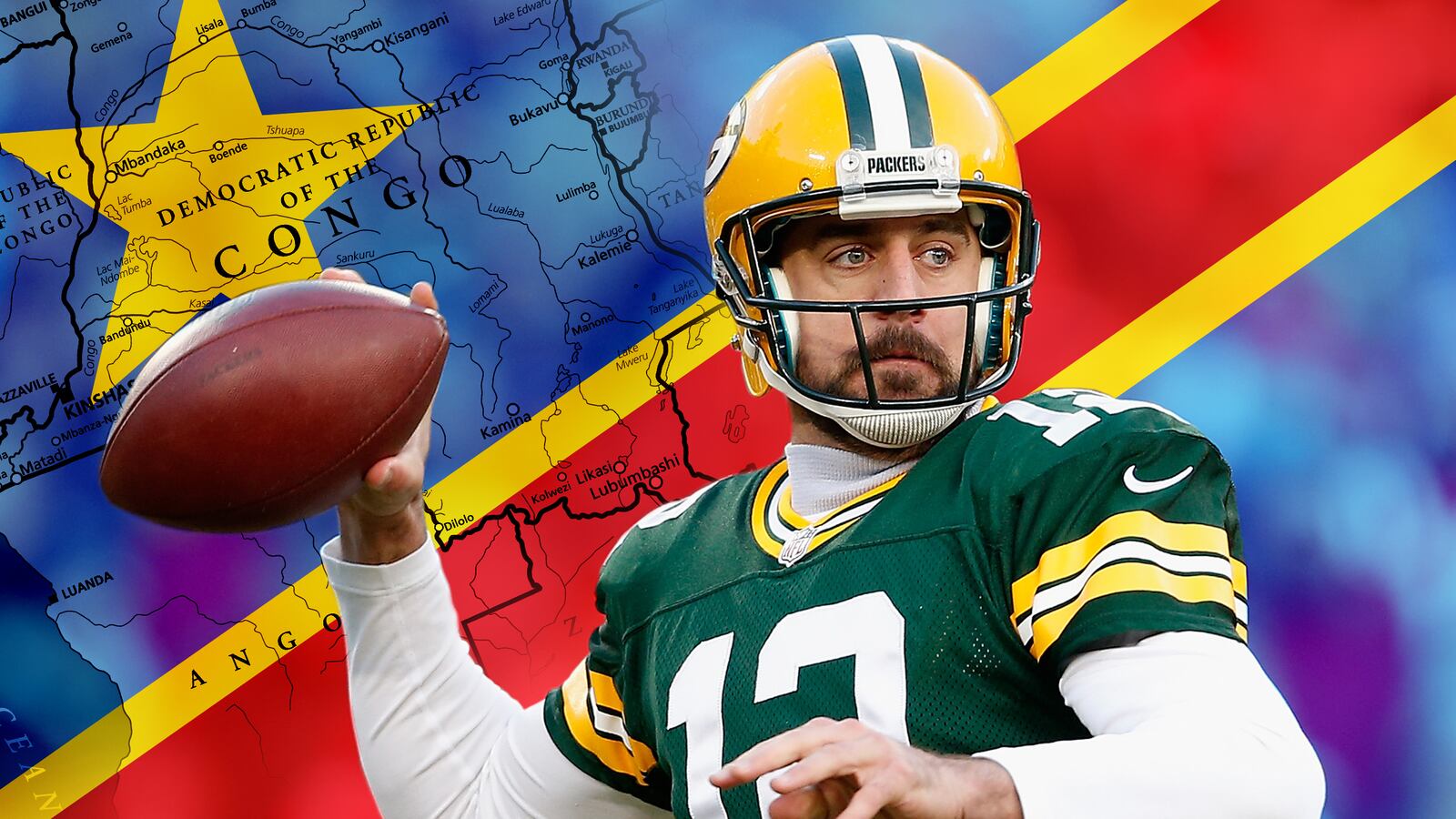Actors, musicians, and athletes have a long tradition of supporting charitable causes. They have collectively raised billions of dollars and redirected attention to countless issues that otherwise would have far less visibility. Understandably, many of these celebrities choose causes that are personal to them or easy to explain or understand. So when the NFL’s leading quarterback decides to take on one of the most complex, and easily the deadliest, war in the world halfway across the globe, it’s worth taking a second look.
Aaron Rodgers of the Green Bay Packers—the Cheesehead in chief—is using an unconventional tool to raise awareness and funds for efforts to end the war in the Democratic Republic of the Congo, which has taken over five million lives. Rodgers is raffling off two tickets and sideline passes to meet him on the field for next week’s Monday Night Football game. Raffling, not auctioning. Usually these “once-in-a-lifetime” experiences are auctioned to the highest bidder, making them inaccessible to the average Joe and Josephine. But at $10 a pop, anyone can win.
Congo’s war has for the most part transpired under the radar over the past two decades. However, in the past few years, efforts have been focused on addressing the one economic driver of violence there to which we are all connected. Some of the raw materials that go into our cellphones, laptops, and gold jewelry are sourced from the Congo, where armed groups have fought and committed horrific human-rights abuses over the spoils of that often illegal trade. The raw materials— tin, tantalum, tungsten and gold—were dubbed “conflict minerals.”
The issue has become controversial in foreign-policy circles of late because some critics believe a law that was passed by Congress in 2010—which required companies to be transparent about the supply chain of these minerals when sourced from Congo—may be making matters worse by throwing some of the miners out of work and by diverting attention from other causes of the conflict.
I beg to differ with the critics. Conflict minerals have been the primary source of revenue for armed groups in eastern Congo since the late 1990s, when skyrocketing demand for video games, cellphones, and laptops drove the prices of Congolese minerals through the roof and made violent smuggling the most profitable game in town. Therefore, reforming this trade is part of a comprehensive strategy, including regional governance reforms, to help end the war. Numerous United Nations expert reports and Congolese think tank studies have documented that minerals were “the engine of the conflict,” and “the principal method used by one of the main rebel groups to raise funds.”
This isn’t just a “Western” issue either. Many prominent Congolese human-rights activists consider minerals to be at the heart of the perpetration of atrocities. Denis Mukwege, winner of the 2014 Sakharov Prize, concluded, “Struggles over the metals in our electronic devices have contributed to the loss of more than five million lives in my country.” And Archbishop Francois-Xavier Maroy Rusengo of the Congolese Diocese of Bukavu confirmed, “War is planned by people who want to get a hold of this wealth. There is a correlation between minerals and rape. Most places that are home to mines are where the assaults on women have been most dramatic.”
In 2014, two-thirds of tin, tantalum, and tungsten (the “3Ts”) mines surveyed by the Enough Project in eastern Congo were found to be conflict-free. This represents major progress in reducing conflict financing. By contrast, before Congress passed its law in 2010, the UN Group of Experts found that in eastern Congo “almost every mining deposit [was] controlled by a military group.” Today, three-quarters of miners working at 3T mines no longer work under threat of armed groups, according to a new independent study by the International Peace Information Service. Several major armed groups that were involved in the conflict minerals trade have decreased significantly in size or have disappeared. However, miners still face harsh conditions and must be supported by more livelihood and jobs programs. Gold continues to fund several armed groups as it is easily smuggled. However, new gold mines are becoming conflict-free as a result of the reform efforts. Progress is slow, but not nonexistent.
Many prominent Congolese groups support the congressional law and further conflict-minerals reforms. Thirty-one Congolese and international experts and 28 other Congolese civil-society groups recently published open letters calling for further minerals reforms to reinforce the U.S. law. Ultimately, disclosure laws are an essential tool for promoting transparent supply chains and corporate accountability. Without these rules, corporations will be free to go back to sourcing minerals for our everyday products from some of the worst war zones on earth with no mechanism for public accountability.
Aaron Rodgers has joined Congolese human-rights advocates, U.S. student activists, Congressional leaders, and committed celebrities to take on an issue that would otherwise be off the radar screen while immense human suffering continues. This opponent is like no other Rodgers has to face on the gridiron. But the payoff—contributing to Congolese and international efforts to end the world’s deadliest war—will be incomparable.
John Prendergast is the founding director of the Enough Project (enoughproject.org).






